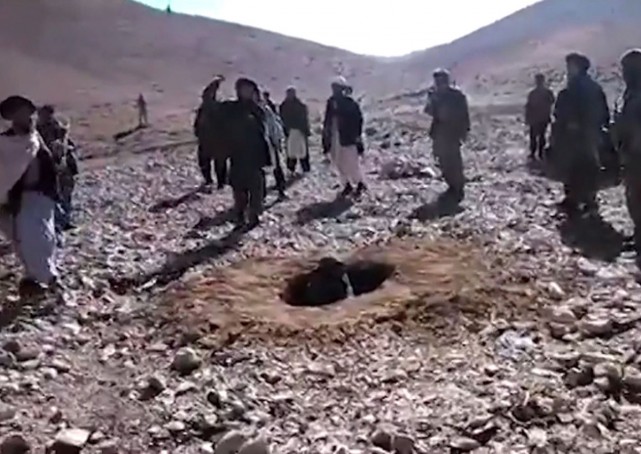Afghan Woman Accused Of Adultery Stoned To Death
A screengrab from the video

NEW DELHI: Officials have confirmed that an Afghan woman who was accused of adultery was stoned to death, with a video appearing to show the brutal punishment posted online.
The 30-second video clip shows a woman in a hole in the ground surrounded by turbaned men who hurl stones at her. The woman’s fiance was lashed.
As the stoning continues, the woman can be heard repeatedly professing her faith.
TOLO news agency reported that the stoning took place in Afghanistan's western zone a week ago, in a village 40 kilometers from Firozkoh, the provincial capital.
“Forced to marry against her will, the woman named Rokhshana was stoned after she was caught eloping with another man in Ghor province,” provincial Police Chief Gen. Mustafa told TOLO. "Taliban ordered stoning of the girl after she was caught eloping with a man on the mountains. Police has started investigations and will arrest the perpetrators soon."
"Yes, the footage shown in the media is related to Rokhsahana, who was stoned to death," confirmed a spokesperson for the local government to AFP.
Seema Joyenda, the governor, confirmed the incident and said that Rokhsana, aged between 18 and 21, was "stoned to death by Taliban, local religious leaders and irresponsible armed warlords."
Joyenda, who is one of Afghanistan’s only two female governors, told TOLO that Rokhshana's family had "married her to someone against her will and she was eloping with a man her age."
Joyenda strongly condemned the incident and called on the Afghan government to take strict measures to bring the perpetrators to justice, as civil society and women's rights activists demanded action.
"This is the first incident in this area but will not be the last. Women in general have problems all over the country, but especially in Ghor... The man with whom she was eloping has not been stoned,” Joyenda told AFP.
The brutal incident has angered many in Afghanistan, where women’s rights and safety has emerged as a key cause of concern. Rights groups have come out in opposition to factions within the country that have attempted to roll back the progress made since the end of Taliban rule.
In recent years, women have faced the brunt of violence in the war-torn country, with a recent UN report noting a 21 per cent increase in the number of women killed in Afghanistan in 2014 from 2013 with 298 women killed and 611 injured.
(2014 saw war-related casualties in Afghanistan reach a record high, with women and children killed also reaching record numbers. Credit: Wikimedia Commons)
Further, women in the country remain concerned that despite the transition to democracy, they remain isolated from the democratic decision making process. According to a report released last year by Oxfam, Afghan women have been systematically excluded from the government’s efforts to start peace talks with the Taliban. “We’ve always been concerned about the threat that our leaders will trade women’s rights away for peace,” said Sara Surkhabi, a senator and one of nine women on the Afghan High Peace Council, which has 61 men, had said at the time (as quoted in The New York Times).
(Burqas fail to shield many Afghan women from daily harassment, both in the street and at the workplace. Credit: Shelly Kittleson/IPS)
This remains a concern as the new government led by President Ashraf Ghani moves to begin a peace dialogue with the Taliban this month.
Women’s right, or rather -- the lack of, in Afghanistan had come to the international media’s attention recently over the controversy surrounding a bill that would effectively deny women facing abuse legal protection being passed by the Afghan parliament last year.
According to the proposed bill, relatives of the accused could not be questioned as witnesses. As a majority of abuse takes place inside the home most often by family members, the bill implies for instance, that a woman who is the victim of domestic abuse at the hands of her husband cannot testify against him or a girl who has been forced into marriage cannot testify against her family.
(The Afghan Independent Human Rights Commission (AIHRC) estimates a 22 percent increase in cases of violence against women. Marius Arnesen/CC-BY-SA-2.0. Credit: IPS)
The outcry that followed the bill’s signing ensured that the President at the time, Hamid Karzai, did not sign the bill into effect. However, the fact that it was proposed and passed by a majority of the two houses of parliament is indicative of the vulnerable position of women in Afghan society.



